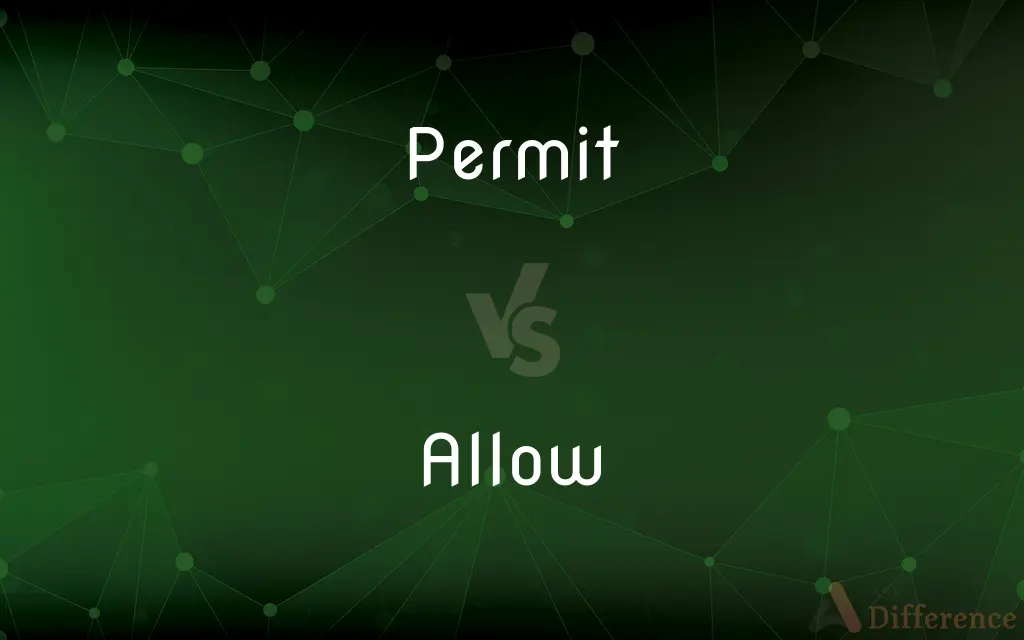Permit vs. Allow — What's the Difference?
By Tayyaba Rehman — Updated on November 6, 2023
"Permit" often implies a formal or official authorization, while "allow" is more general, meaning to not prevent or forbid.

Difference Between Permit and Allow
Table of Contents
ADVERTISEMENT
Key Differences
"Permit" and "Allow" are often used interchangeably, but their connotations can differ. "Permit" suggests an element of formality, official permission, or authorization. For instance, one might need a permit to hold a public event. "Allow," on the other hand, has a more casual tone and is commonly used in everyday situations. It suggests giving someone the freedom or liberty to do something without necessarily requiring official permission.
While both "permit" and "allow" enable an action or condition, the former often requires a permit, which is a document or official agreement, whereas the latter does not. You might allow your friend to borrow a book without any formalities, but a library would permit you to borrow a book, typically through a library card system. This illustrates how "allow" can be informal and "permit" often relates to formal authorization.
The nuance between "permit" and "allow" can also be discerned in legal or regulatory contexts. Laws and regulations do not allow actions; they permit them within defined parameters. "Allow" is used more broadly, often in less formal or non-regulated circumstances. A parent might allow their child to go out with friends, but a legal guardian might need a court's permit to take a child out of the country.
In practice, "permit" can imply that there is a level of discretion or judgment involved in giving permission, while "allow" can simply mean that there is no objection to an action taking place. An employer may permit an employee to work from home, suggesting a special arrangement; conversely, the same employer may allow for flexible working hours, indicating a general policy or practice.
Comparison Chart
Formality
Implies official permission
More casual or general permission
ADVERTISEMENT
Documentation
Often involves a document
Usually no document required
Regulation
Used in legal or official context
Common in everyday language
Discretion
Suggests a level of approval
Indicates lack of objection
Connotation
Can imply limited permission
Often implies freedom within limits
Compare with Definitions
Permit
To grant authorization for something.
The city council will permit the construction of the new park.
Allow
To give permission for something.
Her parents allow her to travel alone.
Permit
An official document granting permission.
He obtained a permit to start his food truck business.
Allow
To enable an action or event to happen.
The new budget will allow for additional hires.
Permit
To allow the occurrence of an activity with certain conditions.
The policy does not permit smoking in the office premises.
Allow
To let do or happen; permit
We allow smoking only in restricted areas.
Permit
To make an action possible.
The open layout of the room permits natural light to flood in.
Allow
To permit the presence of
No pets are allowed inside.
Permit
To allow the doing of (something); consent to
Permit the sale of alcoholic beverages.
Allow
To permit to have
Allow oneself a little treat.
Permit
To grant consent or leave to (someone); authorize
Permitted him to explain.
Allow
To make provision for; assign
The schedule allows time for a coffee break.
Permit
To afford opportunity or possibility for
Weather that permits sailing.
Allow
To plan for in case of need
Allow two inches in the fabric for shrinkage.
Permit
To afford opportunity; allow
If circumstances permit.
Allow
To grant as a discount or in exchange
Allowed me 20 dollars on my old typewriter.
Permit
A document or certificate giving permission to do something
A building permit.
Allow
To admit; concede
I allowed he was right.
Permit
A carangid fish (Trachinotus falcatus) of the western Atlantic Ocean, having a laterally compressed silvery body and a deeply forked tail and valued as a food and game fish.
Allow
To think; suppose
"We allow he's straight" (American Speech).
Permit
(transitive) To allow (something) to happen, to give permission for.
Allow
To assert; declare
Mother allowed that we'd better come in for dinner.
Permit
(transitive) To allow (someone) to do something; to give permission to.
Allow
To offer a possibility; admit
The poem allows of several interpretations.
Permit
(intransitive) To allow for, to make something possible.
Allow
To take a possibility into account; make allowance
In calculating profit, retailers must allow for breakage and spoilage.
Permit
(intransitive) To allow, to admit (of).
Allow
(transitive) To grant, give, admit, accord, afford, or yield; to let one have.
To allow a servant his liberty;
To allow a free passage;
To allow one day for rest
Permit
To grant formal authorization for (something).
The Building Department permitted that project last week.
Allow
(transitive) To acknowledge; to accept as true; to concede; to accede to an opinion.
To allow a right;
To allow a claim;
To allow an appeal
To allow the truth of a proposition
Permit
To attempt to obtain or succeed in obtaining formal authorization for (something).
We've been busy permitting the State Street development.
Allow
(transitive) To grant (something) as a deduction or an addition; especially to abate or deduct.
To allow a sum for leakage.
Permit
To hand over, resign (something to someone).
Allow
(transitive) To grant license to; to permit; to consent to.
To allow a son to be absent.
Smoking allowed only in designated areas.
Permit
An artifact or document rendering something allowed or legal.
A construction permit can be obtained from the town offices.
Go over to the park office and get a permit for the #3 shelter.
Allow
To not bar or obstruct.
Although I don't consent to their holding such meetings, I will allow them for the time being.
Permit
A learner's permit.
Allow
(transitive) To take into account by making an allowance.
When calculating a budget for a construction project, always allow for contingencies.
Permit
(obsolete) Formal permission.
Allow
(transitive) To render physically possible.
Permit
A pompano of the species Trachinotus falcatus.
Allow
To praise; to approve of; hence, to sanction.
Permit
To consent to; to allow or suffer to be done; to tolerate; to put up with.
What things God doth neither command nor forbid . . . he permitteth with approbation either to be done or left undone.
Allow
(obsolete) To sanction; to invest; to entrust.
Permit
To grant (one) express license or liberty to do an act; to authorize; to give leave; - followed by an infinitive.
Thou art permitted to speak for thyself.
Allow
To like; to be suited or pleased with.
Permit
To give over; to resign; to leave; to commit.
Let us not aggravate our sorrows,But to the gods permit the event of things.
Allow
To decide (a request) in favour of the party who raised it; to grant victory to a party regarding (a request).
To allow an objection, to find in favour of the objection and forbid the conduct objected to; to allow an appeal, to decide the appeal in favour of the appellant (contrast grant leave to appeal, to permit an appeal to be heard).
Permit
To grant permission; to allow.
Allow
To praise; to approve of; hence, to sanction.
Ye allow the deeds of your fathers.
We commend his pains, condemn his pride, allow his life, approve his learning.
Permit
Warrant; license; leave; permission; specifically, a written license or permission given to a person or persons having authority; as, a permit to land goods subject to duty.
Allow
To like; to be suited or pleased with.
How allow you the model of these clothes?
Permit
A large pompano (Trachinotus goodei) of the West Indies, Florida, etc. It becomes about three feet long.
Allow
To sanction; to invest; to intrust.
Thou shalt be . . . allowed with absolute power.
Permit
A legal document giving official permission to do something
Allow
To grant, give, admit, accord, afford, or yield; to let one have; as, to allow a servant his liberty; to allow a free passage; to allow one day for rest.
He was allowed about three hundred pounds a year.
Permit
The act of giving a formal (usually written) authorization
Allow
To own or acknowledge; to accept as true; to concede; to accede to an opinion; as, to allow a right; to allow a claim; to allow the truth of a proposition.
I allow, with Mrs. Grundy and most moralists, that Miss Newcome's conduct . . . was highly reprehensible.
Permit
Large game fish; found in waters of the West Indies
Allow
To grant (something) as a deduction or an addition; esp. to abate or deduct; as, to allow a sum for leakage.
Permit
Consent to, give permission;
She permitted her son to visit her estranged husband
I won't let the police search her basement
I cannot allow you to see your exam
Allow
To grant license to; to permit; to consent to; as, to allow a son to be absent.
Permit
Make it possible through a specific action or lack of action for something to happen;
This permits the water to rush in
This sealed door won't allow the water come into the basement
This will permit the rain to run off
Allow
To admit; to concede; to make allowance or abatement.
Allowing still for the different ways of making it.
Permit
Allow the presence of or allow (an activity) without opposing or prohibiting;
We don't allow dogs here
Children are not permitted beyond this point
We cannot tolerate smoking in the hospital
Allow
Make it possible through a specific action or lack of action for something to happen;
This permits the water to rush in
This sealed door won't allow the water come into the basement
This will permit the rain to run off
Permit
To provide the possibility of something happening.
The new software permits easier access to data analysis.
Allow
Consent to, give permission;
She permitted her son to visit her estranged husband
I won't let the police search her basement
I cannot allow you to see your exam
Allow
Let have;
Grant permission
Mandela was allowed few visitors in prison
Allow
Give or assign a share of money or time to a particular person or cause;
I will earmark this money for your research
Allow
Make a possibility or provide opportunity for; permit to be attainable or cause to remain;
This leaves no room for improvement
The evidence allows only one conclusion
Allow for mistakes
Leave lots of time for the trip
This procedure provides for lots of leeway
Allow
Allow or plan for a certain possibility; concede the truth or validity of something;
I allow for this possibility
The seamstress planned for 5% shrinkage after the first wash
Allow
Afford possibility;
This problem admits of no solution
This short story allows of several different interpretations
Allow
Allow the other (baseball) team to score;
Give up a run
Allow
Grant as a discount or in exchange;
The camera store owner allowed me $50 on my old camera
Allow
Allow the presence of or allow (an activity) without opposing or prohibiting;
We don't allow dogs here
Children are not permitted beyond this point
We cannot tolerate smoking in the hospital
Allow
To not prevent or forbid an action.
The company allows casual dress on Fridays.
Allow
To admit or acknowledge something as acceptable.
The regulations allow for some exceptions.
Allow
To make provision for something in a plan or design.
The schedule allows time for regular breaks.
Common Curiosities
Can "permit" be used as a noun?
Yes, "permit" can be a noun representing official permission.
Is "allow" commonly used in everyday language?
Yes, "allow" is frequently used in casual speech and writing.
Are there situations where "permit" and "allow" are not interchangeable?
Yes, in formal or legal contexts "permit" is used for official permissions, while "allow" is more general.
Do both "permit" and "allow" mean to give permission?
Yes, they both involve granting permission, but in different contexts.
Can "permit" imply conditions?
Yes, "permit" can suggest that permission is given with certain conditions.
Can "permit" refer to a legal document?
Yes, "permit" often refers to an official document granting permission.
Can "allow" be used with reference to laws?
Generally, "permit" is used in the context of laws and regulations, not "allow".
Can "allow" be used in a regulatory context?
"Allow" is less common in strict regulatory contexts, where "permit" is preferred.
Is "allow" less formal than "permit"?
Yes, "allow" is generally considered less formal.
Does "permit" always involve an authority figure?
Often, but not always, as it can also imply a general permission in some contexts.
Does "allow" imply any formal approval process?
No, "allow" does not necessarily imply a formal approval process.
Is a "permit" always a physical document?
Typically, it is, especially when used in legal or formal contexts.
Is "permit" used in everyday conversation?
It can be, but it's less common than "allow" for daily informal permissions.
Can "allow" suggest flexibility?
Yes, "allow" can indicate flexibility or leniency in decision-making.
Can both "permit" and "allow" be verbs?
Yes, both can function as verbs in a sentence.
Share Your Discovery

Previous Comparison
Krill vs. Shrimp
Next Comparison
Fair vs. FestivalAuthor Spotlight
Written by
Tayyaba RehmanTayyaba Rehman is a distinguished writer, currently serving as a primary contributor to askdifference.com. As a researcher in semantics and etymology, Tayyaba's passion for the complexity of languages and their distinctions has found a perfect home on the platform. Tayyaba delves into the intricacies of language, distinguishing between commonly confused words and phrases, thereby providing clarity for readers worldwide.
















































